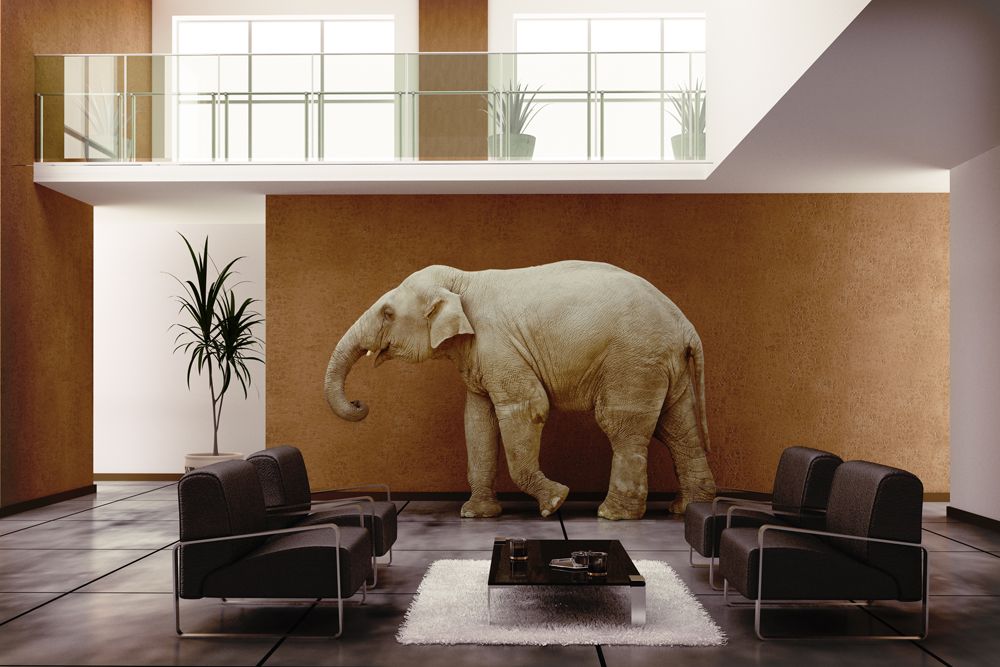Trust can be the Elephant in the Room (or Practice)
Often times, it is important to ask yourself important questions about trust among colleagues in the practice.
Trust can be the Elephant in the Room (or Practice). Photo courtesy of Victor zastol'skiy/stock.adobe.com.

Do you trust your co-workers? I know that is not something rational people like to think about, but it is worth asking yourself this question? What about your boss…do you trust her? I know for many of you that is an easy question to answer, but that is not necessarily the case for the rest of us. I say take it deeper and unpack your feelings about your team.
I am playing devil’s advocate here, but what if you stop and realize that you do not trust the people you work with? What would that mean to you? Is there fear that unethical behavior and a quest for upselling or pushing the patient before they are ready might rub off on you? It is a legitimate question. Think about it. You are in high school. Your friends all drink heavily. Are you more likely to drink if the people around you do? Unpack it. If you are not a drinker, does that impact your friend group? Are you a part of it or do you look for a peer group that is not drinking? Honestly, my money is on the fact that you might feel like the odd person out and find a peer group that is more like you regarding your partying habits.
So, transfer that line of thinking to unethical behavior in the workplace. You and I have seen it. Maybe it was the time when something made you uncomfortable. It might be how a patient was talked to or it is watching a colleague get reamed for something they did not do. That just happened to me yesterday. An outside vendor and I did our job to the best of our ability. There was nothing that could have been done that would have improved the situation or outcome. My client just yelled at me. The more I tried to explain the situation, the worse it got, but then I realized in my old age that he was just venting and taking out his anger on me. Oh yes. I was the innocent. That is the time when I get quiet. There are times when you are trapped. So, I try not to laugh and just sit back and let them get it off their chest. You may wonder why. Confronting the people who control the purse strings is fraught with political landmines. From my experience, the distribution of power is such that it is foolish to confront the inappropriate behavior. Do not get me wrong. I do believe in standing up for myself and do that quite well. But sometimes that is not necessarily the right answer in every situation.
Watching someone being harassed is problematic not just for the victim but for the observers as well. If you jump in to rescue the person, the anger may be redirected your direction. That is not a good feeling. Doesn’t this remind you of high school and what happens when someone is bullied? I have learned that some behaviors follow people through life. But the good news is that you grow up and choose how you to respond to injurious behavior.
So, what does this have to do with trust? Incidents like this build up and tear down the culture of the practice. When you watch someone be abusive, it is impacting you as well. But you choose how to deal with it. I am not going to give you ways to respond to abuse as this is not the focus of the article. Instead, it is how behaviors like that break down trust. How can you trust your colleague 1 minute after watching them behave terribly? Keep in mind that trust is earned, not given out automatically. Trust is something that builds on past experiences. Imagine it as being a building block. It grows taller and taller 1 block at a time, but if the foundation is wobbly the whole thing will collapse.
This is what happens in a practice when the team does not show respect and acceptance. My feelings are that you need to trust the people you work with. If they say they are going to do something, they need to do it. If they are supposed to be at work on time, they should be there. Every time you let down your colleagues, you are tearing down the trust credits you had already accumulated. And what does that do to the practice? It damages it irreparably.
It can be turned around. Do not forget that we all have the capacity to change. But part of change is acceptance. I change. We all change over time. For some, they don’t change so much, and for those folks I always leave the door open. You never know what can come of it.
As far as that elephant in the room, look at your peers and figure out why you do not trust them if that is the case. Then, think about how you can change that. What needs to happen for you to trust that person? The last step is to communicate how you are feeling with a solution in hand. Do not get the person angry and defensive. Just let them know what the elephant is doing and how you can tackle it one step at a time.
Email me at diana@discussdirectives.com and tell me about what your trust level is with your colleagues. I want to know.